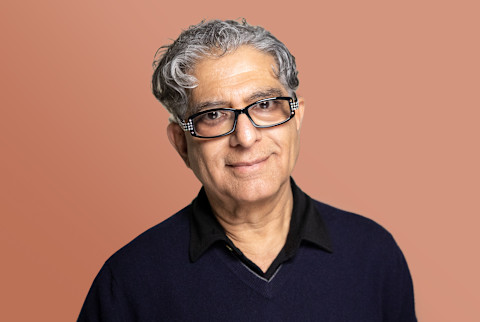How Deepak Chopra Is Using This Time For A Spiritual Reset

While we're facing uncertainty and anxiety during this global pandemic, we can also use our time at home to reconnect with family and friends or jump-start a new hobby. And according to Deepak Chopra, we can use this time at home to slow down and focus on our health: "This is an opportunity to maximize your well-being right now," he tells me on this episode of the mindbodygreen podcast.
Whether that means getting more sleep, managing your stress levels, doing more yoga, or just enjoying the slow pace of your otherwise hectic schedule, maximizing your well-being might look completely different depending on your health goals—and your at-home quarantine itinerary will reflect that.
In terms of what Chopra's doing to maximize his well-being, he's using this time for a "spiritual reset." Just like any positive practice, spirituality requires energy to maintain—and even world-renowned pioneers like Chopra need a little reset sometimes. Here's exactly how Chopra is practicing a "spiritual reset," and how he's planning on applying what he's learned to his post-pandemic life.
He's shifting his meaning of happiness.
According to Chopra, a spiritual reset means identifying new ways to find happiness. Now that we can't shop, see a movie, or even spend time with friends, we have to reconfigure what brings happiness to our lives. "All of that has come to a stop, which, of course, has a big effect on the economy but also forces us to ask how we can be healthy and happy as life goes on," Chopra says.
That said, "reset" what makes you happy. Rather than purchasing items or traveling, think about what makes you truly happy during this time of social distancing. Even identifying the simplest of pleasures can help you figure out what's the basis of your happiness.
He's quieting his mind.
Amid the panic, you might hear things like, "Stay positive!" and "Think positive thoughts!" But according to Chopra, having a positive mind and having a quiet mind are completely different.
"An artificially positive mind can be a turbulent mind, especially if you're feeling stressed," he says. "It can be inflammatory if you're trying too hard to pretend to be positive." What he means is, pretending to exude positivity is not only draining but might actually have the opposite effect.
Instead, try to have a quiet mind: "A quiet mind is a healing mind. The slower your internal dialogue is, the more self-regulation kicks in."
That said, try to practice slowing your thoughts and calming your mind rather than swapping your fearful thoughts for positive affirmations. Whether it's through journaling, meditation, or breathwork, find what technique helps you best quiet your racing thoughts.
He's minimizing stress by practicing empathy.
Reducing stress is critical for a spiritual mindset. Especially during this global pandemic, Chopra advises us to minimize our stress and hysteria as much as we can. "Try to abstain from getting panicked. Panic leads to irrational behavior, and irrational behaviors can become contagious."
Much like the virus itself, our global panic is spreading at quite the rate, with scary headlines and alarming news stories on practically every media channel. The good news is, there's a spiritual way to minimize our stress, according to Chopra. He says the first key step is to practice empathy.
"When you're stressed, ask yourself: Who am I thinking about?" he tells me. "You'll find you're thinking about yourself, and spirituality is not thinking about yourself." If you focus your energy on thinking of others (connecting with others, as well as helping others in need), chances are you'll feel less stressed as a result.
He's creating love in action.
In addition to thinking of others, Chopra is using this time to create what he calls "love in action." While we might tell our friends and family members that we love them, Chopra wants to take it a step further.
"We need to help all of us feel safe, help us all feel secure, help us all that we are engaging in love in action, not just love in theory," he says. "Love in action can create miracles."
Consider this the spiritual version of "show, don't tell." Chopra wants us to take action and care for others; in a time of social distancing, words can only do so much—it's the actions that truly make a difference.
That's not to say you should ignore the rules of a home quarantine. Chopra says there are ways to make sure those in need feel safe: "Use technology—make sure those in distress and those you care about know you can engage with them and help them in some way."
Whether it's providing resources or just offering a safe space to discuss fears, we can all take action to let the people around us know that we love them. After all, we are more connected than we think—and the spiritual notion that "we are all one" is more important now than ever.
